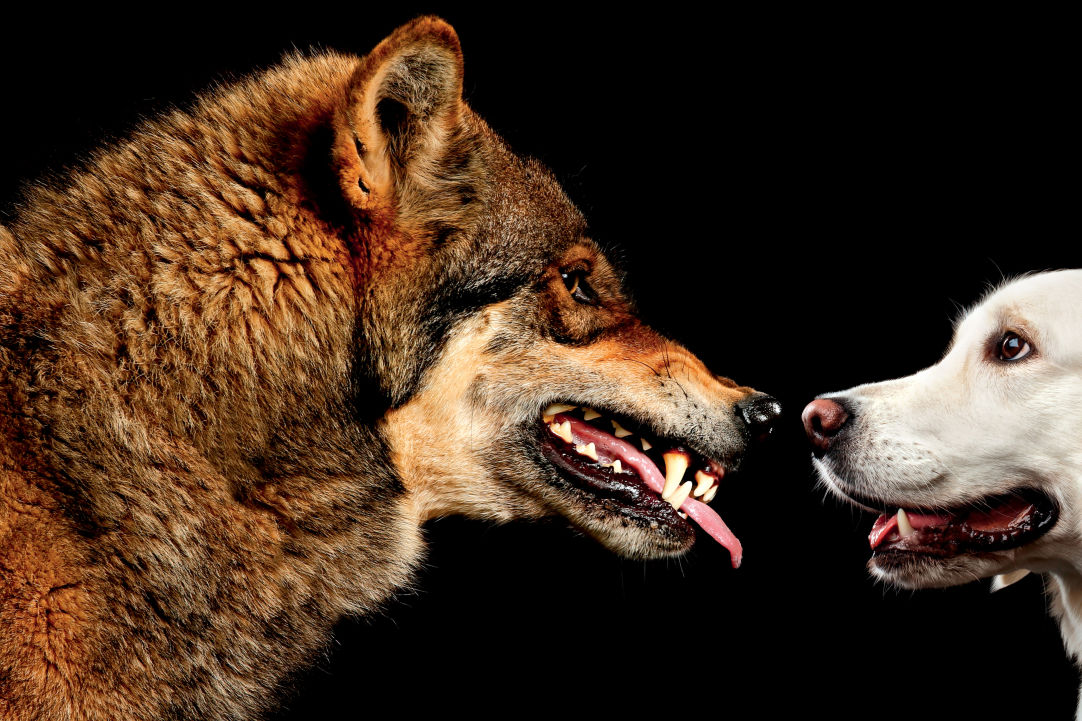Wolf dogs are a hybrid of wolves and dogs, while German shepherds are a pure breed. When selecting a dog, it’s essential to consider a breed’s personality, temperament, and compatibility with its owner’s lifestyle. Both wolf dogs and German shepherds are incredibly loyal, intelligent, and protective of their families. However, wolf dogs require more socialization, training, and exercise due to their wolf bloodlines and may not be ideal for novice dog owners.
On the other hand, German shepherds are commonly used as police and military dogs due to their obedience, trainability, and courage. In this article, we’ll compare and contrast the characteristics, traits, and differences between wolf dogs and German shepherds, to help you decide which breed is the right fit for you.

Credit: www.pdxmonthly.com
Physical Characteristics Of Wolf Dogs And German Shepherds
Wolf dogs and German shepherds have distinct physical characteristics. Wolf dogs are larger, with a height of up to 32 inches and a weight of up to 120 pounds. On the other hand, German shepherds usually grow up to 26 inches and weigh between 50-90 pounds.
Wolf dogs have thicker coats and bushier tails, while German shepherds have shorter hair and a longer stride. German shepherds have a more conical head while wolf dogs have rounder and larger heads. German shepherds are more social and have better communication skills, while wolf dogs are independent and cautious. Overall, both breeds have unique features that make them great pets to own.
Temperament And Personality Traits Of Wolf Dogs And German Shepherds
Wolf dogs and German shepherds both possess unique temperaments and personality traits. While wolf dogs have a higher energy level, German shepherds can be trained more easily due to their intelligence. These breeds also differ in loyalty and protectiveness; wolf dogs may be more independent, while German shepherds are highly loyal and protective.
Compatibility with children and other pets can also vary, with German shepherds being better suited for families with young children. Overall, both breeds have their strengths and weaknesses. As a pet owner, it’s important to consider your lifestyle and preferences before deciding which breed to bring home.
Health And Care For Wolf Dogs And German Shepherds
Caring for a wolf dog or German shepherd requires different approaches. While wolf dogs are prone to hip dysplasia and digestive problems, German shepherds are susceptible to eye disorders and allergies. Regular visits to the vet are vital to maintaining good health.
Exercise is important, but it should be tailored to the dog’s energy level. Daily brushing, bathing, and nail trimming are crucial to keep their coats healthy. Providing a well-balanced and nutritious diet is also necessary. Feeding a wolf-dog a raw meat diet may be ideal while German shepherds may benefit from high-quality kibble. Both breeds require human interaction and socialization. Understanding the unique health and care needs of wolf dogs and German shepherds is essential to keep them happy and healthy.
Training And Socialization For Wolf Dogs And German Shepherds
Training and socializing a wolf-dog requires extensive research and specialized techniques due to their wild instinct. German shepherds, on the other hand, respond well to traditional training methods and socialization techniques. One key difference is that wolf dogs need to be socialized with other wolf dogs, whereas German shepherds can socialize with other breeds.
Potential challenges for wolf dogs include a higher prey drive and the need for large amounts of exercise. Tips for successful training include starting early, using positive reinforcement, and seeking out experienced trainers. German shepherds may display aggression towards strangers if not socialized properly, so early socialization is important. Both breeds require consistent and patient training to be well-behaved family pets.
FAQ For Wolf Dog Vs German Shepherd
What Is The Difference Between A Wolf Dog And A German Shepherd?
Wolf dogs are a mixture of dog and wolf, while German shepherds are primarily a dog breed. Wolf dogs are more unpredictable and require more training.
Are Wolf Dogs More Dangerous Than German Shepherds?
Yes, wolf dogs can be more dangerous than German shepherds and require a higher level of training and socialization. They retain the instinctual traits of wolves, which can make them unpredictable in certain situations.
Which Breed Makes A Better Family Pet, Wolf Dogs Or German Shepherds?
German shepherds are better suited as family pets due to their loyalty and trainability. Wolf dogs are not recommended for inexperienced owners and are better suited for experienced handlers with specific needs, such as in law enforcement or search and rescue work.
Conclusion
Both wolf dogs and German shepherds are fascinating breeds that have their unique strengths and weaknesses. While both breeds share similarities, they differ in several ways that make them stand out. Wolf dogs are physically stronger, and they exhibit a higher level of independence and territorial behavior.
On the other hand, German shepherds make exceptional family pets, with a strong focus on obedience training and loyalty. When it comes to choosing between the two breeds, it’s essential to consider your preferences and lifestyle. If you’re looking for a family-friendly dog that is playful, loyal, and easy to train, then the German shepherd may be a perfect choice.
However, if you’re an experienced dog owner with a passion for nature and outdoor activities, you can’t go wrong with the wolf-dog. Ultimately, both wolf dogs and German shepherds are magnificent breeds that can make great companions.



